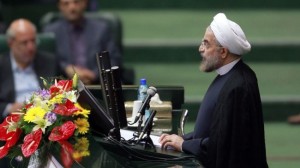 TEHRAN ó Hassan Rouhaniís new presidency in Iran is facing its first hurdle, with members of the countryís conservative-dominated parliament questioning whether some top cabinet nominees have supported Iranís foes.
TEHRAN ó Hassan Rouhaniís new presidency in Iran is facing its first hurdle, with members of the countryís conservative-dominated parliament questioning whether some top cabinet nominees have supported Iranís foes.Public hearings that began Monday have turned†contentious, with hard-line lawmakers singling out for particular criticism Rouhaniís picks for oil minister and foreign minister.
Some observers have dismissed the challenge as little more than political theatrics from hard-liners who have felt marginalized since Rouhani, a moderate cleric and former nuclear negotiator, won Iranís June 14 presidential election resoundingly. Most of Rouhaniís nominees are expected to be confirmed.
But the opposition, nevertheless, has turned hostile, with some lawmakers suggesting that Rouhaniís choices reflect a greater sympathy for opponents of the previous Iranian government than he revealed during his election campaign. Some observers have likened the confirmation hearings to a medieval inquisition.
ďAre the Rouhani before and after election different people?Ē Attaollah Hakimi, an ultra-conservative lawmaker, railed in one of the televised sessions Monday. ďWhy do you want to revive the sedition movement?Ē He was referring to the 2009 protest movement that followed the disputed reelection of President Mahmoud Ahmadinejad.
The intensity of the hearings points to the difficulty that Rouhani may face in bridging the divide between conservatives, with whom he has long worked as a member of the countryís Supreme National Security Council, and reformists, who have overwhelmingly supported his candidacy.
Rouhaniís choice for oil minister, Bijan Namdar Zanganeh, served as campaign adviser to Mir Hossein Mousavi, the opposition leader who lost to Ahmadinejad in the 2009 election. Post-election violence led to the deaths of dozens of protesters, and Mousavi is still under house arrest.
ďZanganeh is not at all a suitable candidate for the Oil Ministry,Ē Mehdi Mousanejad, a member of parliamentís energy commission, said in a legislative hearing this week. ďHis thought process and his relationships with those in the sedition movement cannot be forgotten.Ē
Mohammad Javad Zarif, the nominee to become foreign minister, was educated at the University of Denver. His ability to assimilate into U.S. society during his time as ambassador to the United Nations from 2002 to 2007 has drawn particular ire from the conservative establishment.
Those opposed to Zarifís nomination have questioned his loyalty to the Islamic revolution and allege that he arranged and attended a 2006 meeting in New York between Mohammad Khatami, a former Iranian president, and George Soros, the American billionaire philanthropist and human rights activist. They also charge that Zarif is a permanent resident of the United States. He denies both claims, and analysts say his strong international reputation will ultimately benefit his candidacy.
ďZarif will get a majority vote as anyone who knows Iran foreign policy admits he is very well-experienced and suitable for the post,Ē said Hassan Beheshtipour, a Tehran-based analyst.
Zanganeh, the nominee to become oil minister, held that job under Khatami from 1997 to 2005 ó years that are widely considered the most successful for Iranís oil industry.
Iranís output has been increasingly hampered by sanctions over the past two years, but Zanganeh has pledged to†restore oil production†to its previous highs.
Rouhaniís supporters have expressed hope that the nomineesí track record in getting results will trump political allegiances in the confirmation process, and independent analysts say the new president has emphasized pragmatism.
ďThe general composition of his cabinet so far is toward competence rather than ideological purity, which is refreshing,Ē said Djavad Salehi-Isfahani, an economics professor at Virginia Tech who visits Iran frequently.
ďThe same type of forces in the U.S. Congress that grill Cabinet nominees are present here, too,Ē said Mohammad Ali Shabani, a political analyst in Tehran. ďWith a couple of possible exceptions, most of Rouhaniís nominees will be confirmed in the end.Ē
Others say the process demonstrates the democratic elements of the Islamic republicís political system.
ďThis is the nature of such sessions,Ē Beheshtipour said. He said he has seen several parliamentary hearings on cabinet nominees under the administrations of Ahmadinejad, Khatami and Ali Akbar Hashemi Rafsanjani, ďand it has always been like this.Ē
By The Washington Post
The Iran Project is not responsible for the content of quoted articles.










